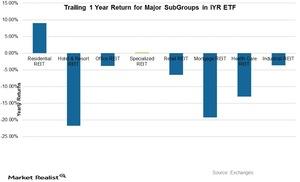Specialized REITs: The Unsung Heroes
With the growing economy and global investment horizons, investments have shifted beyond the traditional options to specialized REITs.
Jan. 12 2016, Updated 9:13 a.m. ET

Investments beyond traditional REITs
Over the years, traditional REITs such as mortgage, healthcare, office, and residential REITs have been the first choice of investors. However, with the growing economy and global investment horizons, investments have shifted beyond the traditional options to specialized REITs.
Specialized REITs
Specialized REITs are similar to their traditional counterparts. Specialized REITs engage in the development, leasing, acquisition, and operation of properties not classified elsewhere. A specialized REIT can invest in properties beyond the framework of traditional REITs such as movie theaters, timber companies, race tracks, baseball parks, and golf courses.
The iShares Dow Jones US Real Estate ETF (IYR) provides exposure to real estate companies and REITs. Specialized REITs account for 25.1% of IYR’s total market capitalization. Public Storage (PSA) is the largest specialized REIT with a market capitalization of $43.5 billion. It’s followed by American Tower (AMT) with $41.7 billion and Crown Castle International (CCI) with $29 billion.
The above graph shows how specialized REITs and residential REITs have generated positive returns of 0.2% and 9%, respectively, on a yearly basis. However, traditional mortgage, healthcare, and office REITs have all ended up with negative returns. Investors could start thinking about investing in properties beyond the traditional ones.
Investors looking for diversification in the specialized REIT sector can get exposure through the iShares Cohen & Steers REIT ETF (ICF) and the Vanguard REIT ETF (VNQ).
